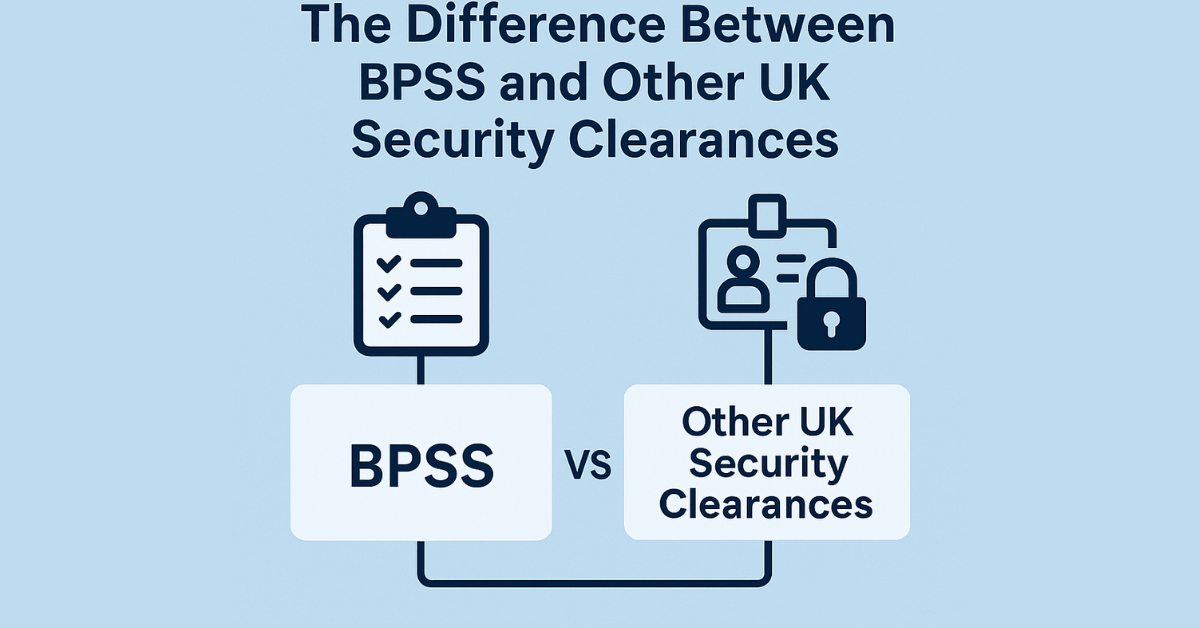When working in sensitive or high-security roles in the UK, clearance checks are more than just formalities; they are legal and procedural necessities. From the Baseline Personnel Security Standard (BPSS) to higher levels of vetting like SC, CTC, or DV, each serves a unique purpose. Understanding the differences between the BPSS and other UK security clearances is essential for employers and professionals alike.
We have compiled this blog to discuss the difference between BPSS and SC clearance, how BPSS compares with other levels of vetting, and why selecting the appropriate clearance is key to workforce integrity and national security.
Table of Contents
ToggleWhat Is BPSS?
While not considered a formal security clearance, BPSS involves a set of pre-employment checks designed to verify a person’s identity, employment history, criminal record, and legal right to work in the UK. These checks are essential for individuals taking on roles in government departments, defence-related contracts, or other positions involving sensitive access.
What BPSS Includes
- Proof of identity and address
- Right to work in the UK
- Employment history (covering the last three years)
- Criminal record (unspent convictions)
The BPSS check helps employers mitigate insider threats by confirming a candidate’s honesty, reliability, and eligibility to access sensitive but unclassified information.
What Is Security Clearance (SC)?
Security Clearance (SC) is a more in-depth vetting process than BPSS. It is typically required for individuals who will have access to secret information, intelligence data, or sensitive systems. The UK government grants SC clearance after an investigation by the United Kingdom Security Vetting (UKSV).
What SC Clearance Includes
- All BPSS checks
- Criminal, credit, and security service records check
- Detailed employment and personal history
- References and potential interviews
- Checks on close family members
The difference between BPSS and SC clearance becomes clear here; while BPSS is more about eligibility and basic reliability, SC clearance assesses a person’s integrity, risk level, and ongoing suitability for handling classified information.
BPSS vs Security Clearance: Key Differences
When comparing BPSS vs Security Clearance, it’s important to focus on three major aspects: depth of vetting, level of access granted, and duration.
Purpose
- BPSS: Used to verify identity, legal right to work, and general trustworthiness during employment screening
- SC Clearance: Required for roles needing access to classified government data
Access Level
- BPSS: Authorises access to information classified as Public or Official
- SC Clearance: Allows access to Secret-level information and systems
Depth of Checks
- BPSS: Covers verification of identity, criminal record, and legal right to work
- SC Clearance: Includes BPSS plus checks on financial status, personal background, family details, and potential security risks
Who Needs It
- BPSS: Suitable for entry-level positions, IT support teams and public sector employees
- SC Clearance: Required for defence staff, intelligence roles, and government contractors
Renewal Frequency
- BPSS: Usually reviewed every 10 years or when switching jobs
- SC Clearance: Generally renewed every 5 years or if a role’s security scope changes
In short, BPSS is a gatekeeping standard, while SC and higher clearances are for those working directly with sensitive government information.
Other UK Security Clearances Compared
Besides SC and BPSS, there are several other levels of vetting in the UK. Here’s how they stack up.
Counter Terrorist Check (CTC)
Required for roles that involve access to buildings or information vulnerable to terrorist threats, such as airport staff or security personnel. CTC includes:
- BPSS
- Criminal record check
- Security service records check
- Personal reference verification
Developed Vetting (DV)
Developed Vetting (DV) applies to individuals needing access to top-secret information. The process involves:
- All components of SC
- In-depth interviews
- Assessment of personal relationships, lifestyle, and finances
Each level builds on the checks done at the BPSS level, offering greater scrutiny depending on the role’s sensitivity.
When Is BPSS Sufficient?
For many positions in the public sector or roles supporting government functions, like IT contractors, admin staff, or NHS workers, a BPSS check is all that’s required. It confirms you’ve done your due diligence before bringing someone into a position of responsibility.
However, it is not suitable for roles involving access to confidential, secret, or top-secret materials. That’s when SC or DV clearances are mandatory.
Can You Upgrade from BPSS to SC?
Yes, BPSS is typically the initial stage in the overall security vetting process. Before you can apply for SC, DV, or CTC, your BPSS must be in place. If an employee’s role changes or their responsibilities grow, they may be asked to undergo additional vetting. It’s important to note that SC and DV clearances cannot be obtained through personal application; they require employer sponsorship. BPSS, on the other hand, remains valid indefinitely, provided there is no break in employment.
Why Employers Must Understand the Differences
Mistaking one clearance for another can lead to serious operational delays or compliance issues. If your employee needs SC clearance but only holds BPSS, they will not legally be allowed to access the required information, causing project disruption. Clear knowledge of the BPSS and other UK Security Clearances differences also:
- Protects sensitive information
- Reduces the risk of insider threats
- Ensures regulatory compliance
- Builds credibility with government partners
Common Misconceptions About BPSS
There are a few misunderstandings about what BPSS actually covers:
- “It’s a security clearance.” Technically, it is not. It’s a background screening standard, not a classification.
- “It includes a credit check.” No. BPSS only checks unspent criminal records, not financial status.
- “It covers all past employment.” BPSS looks at the last three years. Anything more detailed requires SC or DV.
Final Thoughts
For most public-sector or entry-level roles, BPSS is enough. For roles handling classified or intelligence material, higher clearance levels like SC, CTC, or DV are essential.
Need a BPSS check online? At BPSS Check, we make the process simple, fast, and fully compliant. Trust us to help you manage your security check clearance needs accurately, efficiently, and professionally.

